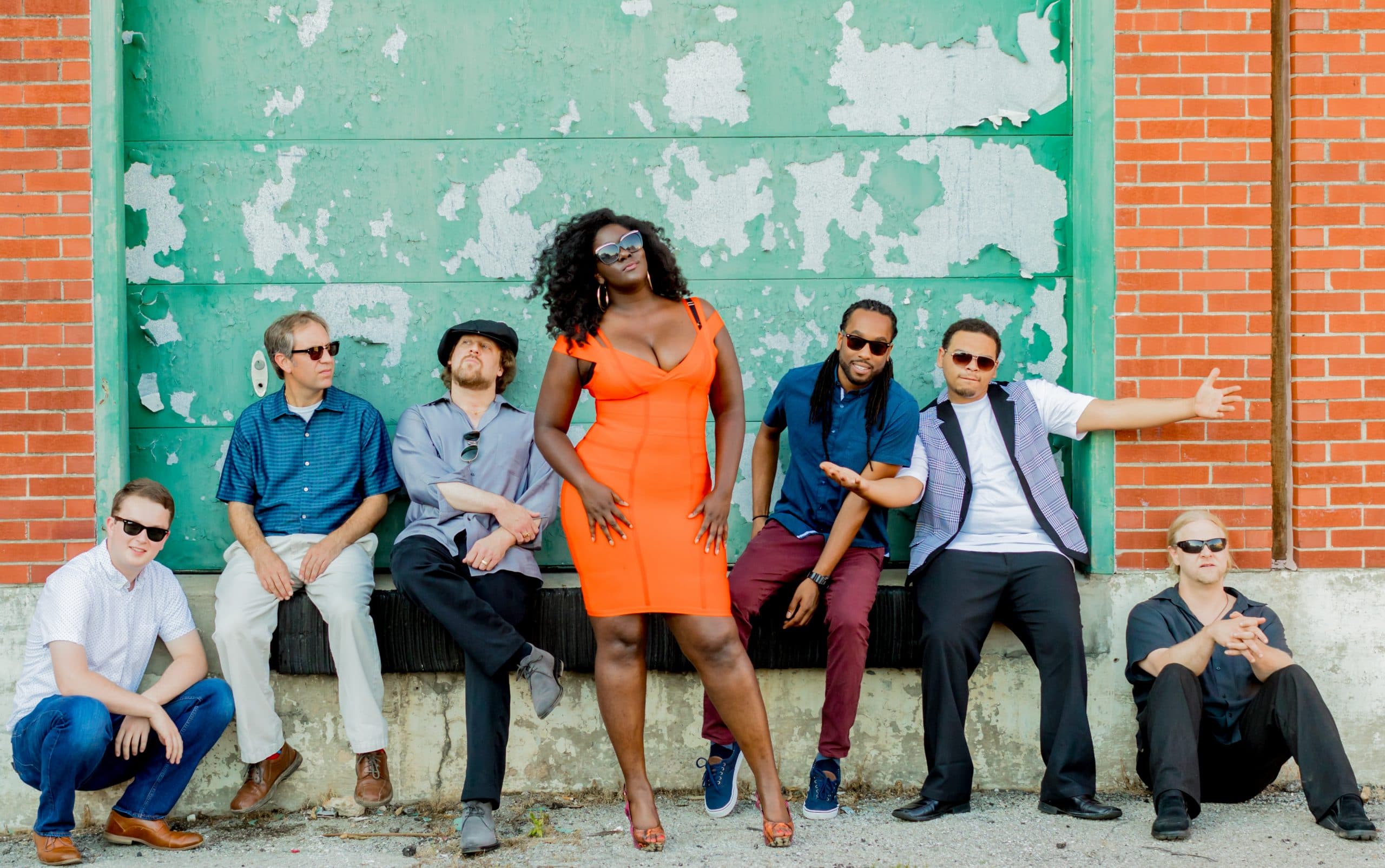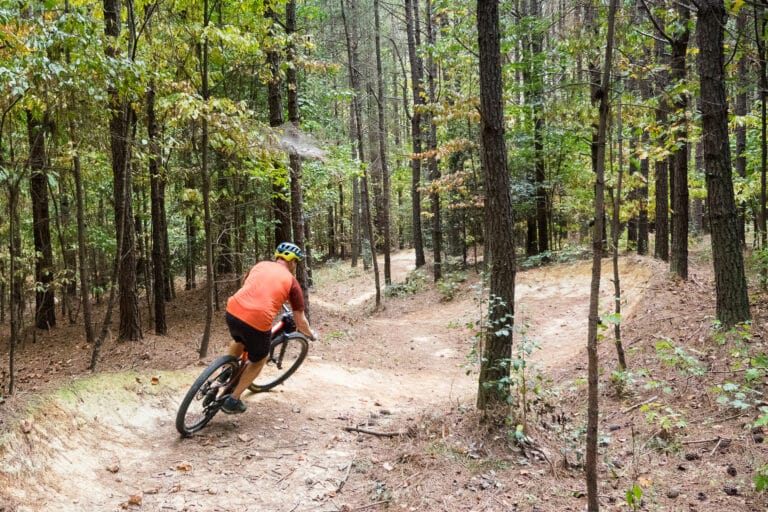Cover photo by Dwayne Lloyd
For our May issue, artists across the Blue Ridge talked with BRO about what it meant to make music in a year without in-person performances. For the next four weeks, we will be featuring each of those artists and taking a deeper dive into their creative process.
Although their whirlwind of a tour was canceled for 2020, Joslyn and the Sweet Compression, a seven-piece R&B band out of Kentucky, managed to find a few treasured moments. BRO chatted with lead vocalist Joslyn Hampton and guitarist and songwriter Marty Charters about making a record in the midst of a pandemic.
BRO: Heading into 2020, what were your plans? What did your year end up looking like?
MC: We had 46 dates in 13 states canceled. Talks for a European tour in the fall dissolved. We signed with a booking agency on a Tuesday and on Thursday, our first gig was canceled and all subsequent gigs canceled. It was a disaster. My outlook was absolutely bleak. Joslyn was way more positive about the whole thing.
JH: Don’t get me wrong. It totally sucked. We really wanted to get out there. I love what I do. I missed the stage and the people. But at the same time, I looked at it like what is meant to be will be. When we do get back at it, we’re not going to have the time to ourselves like we do right now. We won’t have the time to really reflect, grow, think, write, and produce more music. This is a free time to be productive. Granted, sometimes we weren’t progressing at all.
MC: I wasted great chunks of time. I was just despondent and did nothing for a long time. But then we got on the stick and made a record. We feel like we’re in a better place than some people given that some people released a record and were not able to play a single date to support it. Some people had release dates in the spring and summer. In some cases, they had already paid a publicist and already had a publicity run and were gearing up for a summer tour to support a record. So I just thank god we weren’t releasing one. We recorded one instead. It’s just sitting around the can waiting to be released at a later date when the time is right.
Was the recording process for this album different from the ones you’ve put out in the past?
MC: It wasn’t radically different except for the constant concern looming over your head and scheduling. Our recording was always taking place in chunks as time and money allows. We basically record until I’m broke and then when we have the money again, we go back in and continue working. The only thing that was a little different was many times Joslyn started to sing and we said, “wait a minute. What’s that muffled sound?,” because she had forgotten to take her mask off.
JH: It happened often.
Virtual shows took off in 2020. How did you all approach staying connected with fans and audiences during this time?
JH: We had a few virtual things. We had a Juneteenth festival we did virtually. We have a friend who does a coats for covers type of evening every year to get the children of Kentucky coats and donations. So we did those two things and that’s pretty much it. We thought we’re going to come back and come hard and come strong when it’s time to do that.
MC: We did those two because they were for exceptional causes. But we did a tiny fraction of the ones that we were asked to be involved in, because not only were we unexcited about it, frankly, but also because we don’t fare well in those circumstances. You get some Americana artists with an acoustic guitar or a duo with a guitar and mandolin, you could set up a couple mics and pull off something pretty similar to what they do every night. But we’re a seven-piece R&B band with horns. It’s funk soul music so you can’t really cram seven people in front of a mic and expect to get it right. We don’t like scaling it down. The ones we did do had full-scale production. There was a live sound person who treated it as a show for an audience.
Have you all started scheduling live performances yet?
MC: Our schedule is actually impressive for 2021 already. It’s just a matter of whether the dates will hold. A couple of things that were canceled last year where they asked us to carry over to this year, some of those have already been canceled for this year. A vast majority are outdoors through the spring and summer. With the number of people being vaccinated, it being outdoors, all the guidelines and restrictions in place for the total number of people and distance between them, all the dates we’ve agreed to seem safe on paper.
What did you miss most about live shows?
JH: I miss the people and the energy more than anything. There is something about being on stage and having people there that you know came to hear you do what you love to do; being able to get on stage and affect people’s emotions just by doing what you love. I miss the interactions with people; I miss hugging people; I miss people singing along. I miss my boys. I don’t get to see them anymore really. I miss my band family. You don’t realize the small things you might take for granted till you can’t do it. You might not have noticed how much you really do need that outlet and energy. For me, it’s like plugging into a charger to get refueled.
In a year when we’ve all been pretty socially isolated and unable to do a lot of our routine things, what were some of the things that helped you get through the past year?
MC: We did make a record, and that’s a big deal. So it would be wrong to say that the whole time was squandered. It wasn’t. A lot of people adjusted and decided to get in shape, learn to hula hoops, or musically expanded in some sort of way. I deal with the business with the band. I’m talking to the manager every single day. We’re just going down a hypothetical lane every day—if this, if only that, and maybe this. Most encouraging things just didn’t happen. I spent a lot of time despondent about it so I don’t feel like I fared as well as a lot of people as far as making use of it.
JH: I just found other ways to have an outlet artistically. I started painting. I took out my keyboard and tried to relearn how to do scales. That’s about all I can do at this point.
MC: I did listen to some new stuff that I believe will come out in future songs. I dug into a lot of carbohydrates.
JH: Many of us did. Food is always there for me. Period.
MC: I thought carbs and I were so close, and they ended up stabbing me in the back.
As we are starting to see some hope coming out of this pandemic, is there something from the past year that you’ve learned or experienced that you want to carry forward with you?
JH: To always make time for myself, to be alone with myself to decompress. Sometimes you can be overstimulated and not realize it. I had a lot of time with me without anyone else there. I feel like I’ve grown a lot over this last year. For me, to always remember to, at least once a month, do something for myself—take myself out to eat, sitting in my room meditating, watching a movie, or reading a book.
MC: I think I’ll come away a little more resilient to disappointment. I’m older than everybody else, and I think it hit me harder because I didn’t have a year to spare. I don’t have two years to spare, for sure. I think when you’re still in your late 20s, early 30s, you feel like eh, it’s a year. Me being older than the others, I think I felt more desperately unhappy about the lost time. At the same time, our drummer said recently, “What I learned is I will never take this for granted again.” When you’ve done several gigs in a row and this one just seems like another gig and you’re not really up for it. He said, “I intend to be jacked for every one of them from now on. I refuse to take it for granted anymore. Every gig we do, I’m going to feel very privileged to be doing it.” I thought that was a great outlook and I’m going to try to carry that with me a little bit, try to get with the youthful ones on their positive outlook.
From your perspective, as musicians and a band who tours a lot, what do you see the live music industry looking like going forward?
MC: A lot of venues have closed. Some will be gone for good; others have held on but will be struggling. There’s definitely a new outlook with regard to the financial deals. Venues, and even festivals who lost a lot of money, blown sponsors, and advertising money wasted, it’s all scaled down. We lost more than a year. We’ve lost some ground with regard to career growth, particularly on the financial end. But when a venue or festival has taken a beating and is lucky to be around, the deals they’re making with you now are significantly less artist-friendly than they used to be. You want to be upset with the toll it’s taken on you, yet you really can’t argue with them because they’ve taken a beating. So you have to understand the cooperative effort that’s going on there. In many cases, we’ve had to settle for deals that just aren’t nearly as attractive as they used to be because we’re all trying to survive.
JH: It’s going to take a while for artists to bounce back. Financially, venues and artists got their butts handed to them. Just got to work with what you get.
MC: Now a lot of venues are converting to outdoor shows, A) by necessity in order to run shows and B) in some cases, they’re going to continue to do this in the summer, COVID or no COVID because they figured out their cap doubles. We did 300 people inside; we can fit 750 people outside. So once they make a few structural changes, they could do this. That would be an example of a good long term effect.
You can see Joslyn and The Sweet Compression at a few upcoming outdoor festivals, including Mountain Music Festival (Oak Hill, W. Va. June 4).






